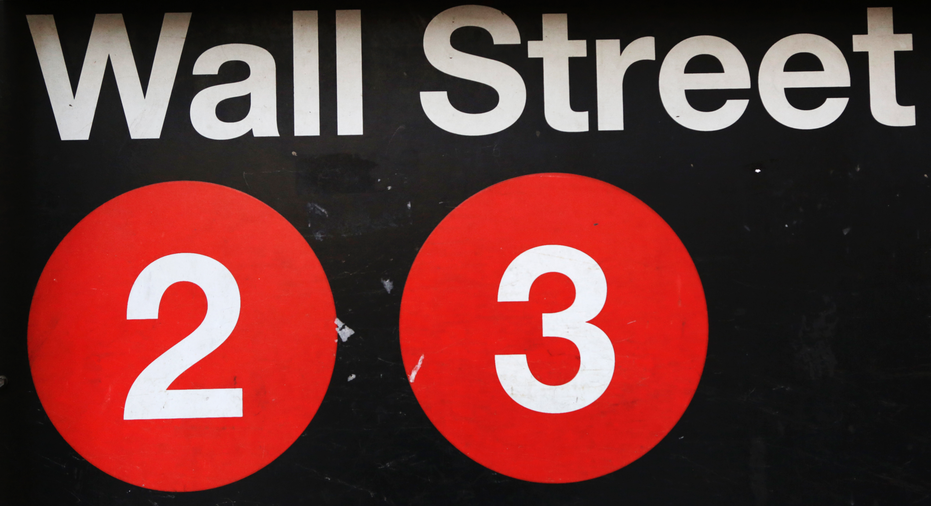Stocks sink as technology rally fades; Qualcomm drops

U.S. stocks are slipping Tuesday after technology companies gave up an early gain. Qualcomm is skidding after President Donald Trump blocked a bid for the chipmaker by Singapore-based rival Broadcom. Trump said he opposed the deal because it could have been detrimental to national security. However investors were pleased that a Labor Department report showed inflation remained in check last month.
KEEPING SCORE: The S&P 500 index lost 9 points, or 0.4 percent, to 2,773 as of 2:40 p.m. Eastern time. The Dow Jones industrial average was down 83 points, or 0.3 percent, to 25,091. It was up as much as 197 points in the first minutes of trading before turning lower in the early afternoon.
The Nasdaq composite fell 53 points, or 0.7 percent, to 7,535. That threatened a seven-day winning streak that took the technology-heavy index to record highs. The Russell 2000 index of smaller-company stocks dipped 3 points, or 0.2 percent, to 1,597.
BROADCOM BLOCKED: Broadcom had been trying to buy Qualcomm for several months, most recently offering $117 billion. The deal would have been the largest in the history of the technology industry, although Qualcomm was trying to fend it off. Trump's decision followed a recommendation from the Committee for Foreign Investment in the U.S., which said Broadcom might cut back on research and development spending.
Qualcomm is one of the biggest makers of processors that power smartphones and other mobile devices. The takeover bid came as other countries are also getting ready to build faster "5G" wireless networks.
"Details of the security risk are likely around 5G cellular technology which Qualcomm, in our view, is well ahead of foreign and domestic competitors," said Stifel analyst Kevin Cassidy.
Analysts said the move was unusual: Daniel Ives of GBH Insights called it "unprecedented" and said Qualcomm stock may be stuck around $60 for an extended period.
Qualcomm slid $2.94, or 4.7 percent, to $59.987. Broadcom rose more than 3 percent earlier on but later fell 4 cents to $262. 08. Intel, a competitor, added 29 cents to $51.81. The Wall Street Journal reported Friday that Intel wanted to stop the deal and might try to buy Broadcom to make that happen.
DEAL DANGER?: Trump also cited national security risks this month in announcing tariffs on imported aluminum and steel, and investors appeared to be wondering if at least one other deal will face new obstacles. In November Bermuda-based chipmaker Marvell Technology Group agreed to buy competitor Cavium for $6 billion. Cavium lost $3.02, or 3.5 percent, to $87.75 while Marvell lost $1.09, or 4.5 percent, to $23.29.
PRICES RIGHT: The government said prices paid by consumers rose 0.2 percent in February, matching estimates. Excluding food and energy costs, prices have risen 1.8 percent in the last year. Prices had jumped in January. Over the last month investors have worried about the prospect of faster inflation, but Tuesday's price report and the monthly jobs report on Friday suggest inflation isn't moving any more rapidly than it did in the recent past.
"If you put the two of them together it paints a very clear picture of an economy that's operating at a very high level, that's showing some inflation, but not overheating inflation," said Rick Rieder, BlackRock's chief investment officer of global fixed income.
Rieder said that in general, service costs are rising and the costs of goods are falling, although clothing prices have bounced back a bit recently.
REACTION: With investors expecting slower gains in rates, bond yields headed lower. The yield on the 10-year Treasury note slipped to 2.84 percent from 2.87 percent. Faster inflation would likely result in the Fed raising interest rates more quickly. Investors feared that could significantly slow the economy and the market's gains.
Lower yields mean lower interest rates, and that pulled bank stocks lower on Tuesday.
Companies that are considered bond proxies, like phone companies and utilities, traded higher. They often move in the opposite direction of bond yields because investors buy them for their big dividend payments when yields fall.
ENERGY: Benchmark U.S. crude slumped 65 cents, or 1.1 percent, to $60.71 a barrel in New York. Brent crude, used to price international oils, lost 31 cents to $64.64 per barrel in London.
Wholesale gasoline fell 1 cent to $1.89 a gallon. Heating oil rose 1 cent to $1.87 a gallon. Natural gas gained 1 cent to $2.79 per 1,000 cubic feet.
METALS: Gold added $6.30 to $1,327.10 an ounce. Silver rose 9 cents to $16.63 an ounce. Copper gained 1 cent to $3.14 a pound.
CURRENCIES: The dollar rose to 106.61 yen from 106.35 yen. The euro rose to $1.2396 from $1.2336.
OVERSEAS TRADING: Germany's DAX shed 1.6 percent. Britain's FTSE 100 lost 1.1 percent while the CAC 40 in France slid 0.6 percent.
The Japanese Nikkei 225 index gained 0.7 percent and the Kospi of South Korea added 0.4 percent. In Hong Kong, the Hang Seng was unchanged.
____
AP Markets Writer Marley Jay can be reached at http://twitter.com/MarleyJayAP . His work can be found at https://apnews.com/search/marley%20jay .